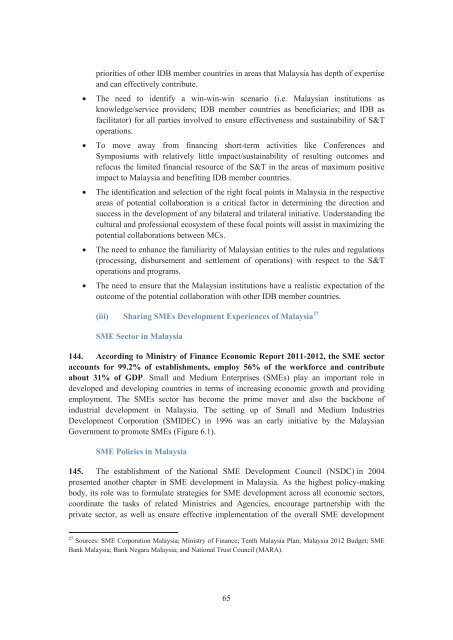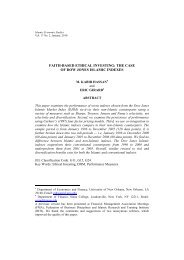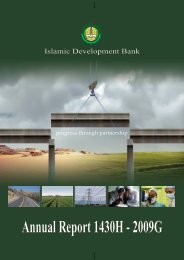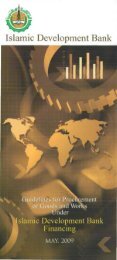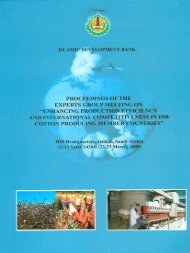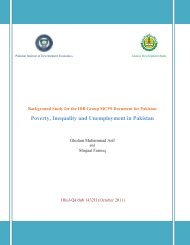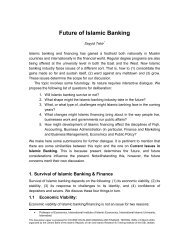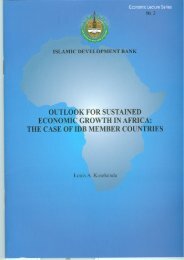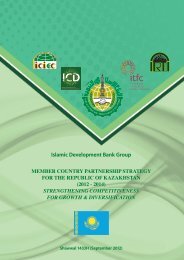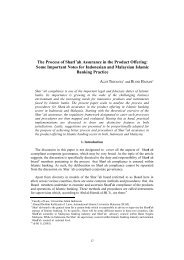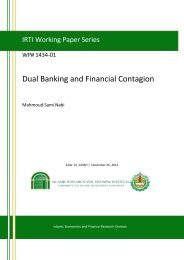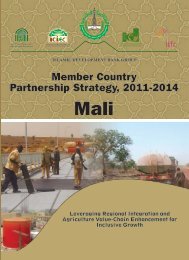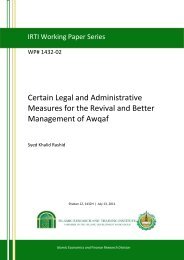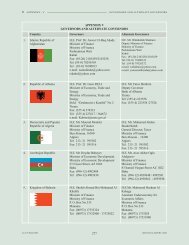Country Economic Work for Malaysia - Islamic Development Bank
Country Economic Work for Malaysia - Islamic Development Bank
Country Economic Work for Malaysia - Islamic Development Bank
Create successful ePaper yourself
Turn your PDF publications into a flip-book with our unique Google optimized e-Paper software.
priorities of other IDB member countries in areas that <strong>Malaysia</strong> has depth of expertise<br />
and can effectively contribute.<br />
The need to identify a win-win-win scenario (i.e. <strong>Malaysia</strong>n institutions as<br />
knowledge/service providers; IDB member countries as beneficiaries; and IDB as<br />
facilitator) <strong>for</strong> all parties involved to ensure effectiveness and sustainability of S&T<br />
operations.<br />
To move away from financing short-term activities like Conferences and<br />
Symposiums with relatively little impact/sustainability of resulting outcomes and<br />
refocus the limited financial resource of the S&T in the areas of maximum positive<br />
impact to <strong>Malaysia</strong> and benefiting IDB member countries.<br />
The identification and selection of the right focal points in <strong>Malaysia</strong> in the respective<br />
areas of potential collaboration is a critical factor in determining the direction and<br />
success in the development of any bilateral and trilateral initiative. Understanding the<br />
cultural and professional ecosystem of these focal points will assist in maximizing the<br />
potential collaborations between MCs.<br />
The need to enhance the familiarity of <strong>Malaysia</strong>n entities to the rules and regulations<br />
(processing, disbursement and settlement of operations) with respect to the S&T<br />
operations and programs.<br />
The need to ensure that the <strong>Malaysia</strong>n institutions have a realistic expectation of the<br />
outcome of the potential collaboration with other IDB member countries.<br />
(iii) Sharing SMEs <strong>Development</strong> Experiences of <strong>Malaysia</strong> 27<br />
SME Sector in <strong>Malaysia</strong><br />
144. According to Ministry of Finance <strong>Economic</strong> Report 2011-2012, the SME sector<br />
accounts <strong>for</strong> 99.2% of establishments, employ 56% of the work<strong>for</strong>ce and contribute<br />
about 31% of GDP. Small and Medium Enterprises (SMEs) play an important role in<br />
developed and developing countries in terms of increasing economic growth and providing<br />
employment. The SMEs sector has become the prime mover and also the backbone of<br />
industrial development in <strong>Malaysia</strong>. The setting up of Small and Medium Industries<br />
<strong>Development</strong> Corporation (SMIDEC) in 1996 was an early initiative by the <strong>Malaysia</strong>n<br />
Government to promote SMEs (Figure 6.1).<br />
SME Policies in <strong>Malaysia</strong><br />
145. The establishment of the National SME <strong>Development</strong> Council (NSDC) in 2004<br />
presented another chapter in SME development in <strong>Malaysia</strong>. As the highest policy-making<br />
body, its role was to <strong>for</strong>mulate strategies <strong>for</strong> SME development across all economic sectors,<br />
coordinate the tasks of related Ministries and Agencies, encourage partnership with the<br />
private sector, as well as ensure effective implementation of the overall SME development<br />
27 Sources: SME Corporation <strong>Malaysia</strong>; Ministry of Finance; Tenth <strong>Malaysia</strong> Plan; <strong>Malaysia</strong> 2012 Budget; SME<br />
<strong>Bank</strong> <strong>Malaysia</strong>; <strong>Bank</strong> Negara <strong>Malaysia</strong>; and National Trust Council (MARA).<br />
65


